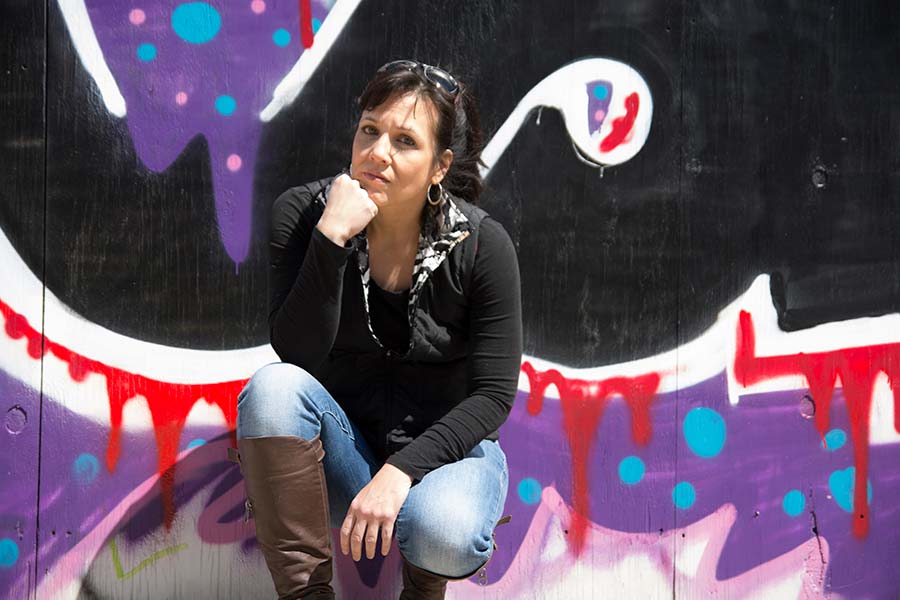

Venture Boldly

Office of Communications
2 East South Street
Galesburg, IL 61401

Marriage and Family Therapist and Comedian
Major in Sociology and Anthropology and Psychology

Transitioning from life as a student to life as a working adult can be a strain, particularly during an ongoing pandemic. Knox alumna Valerie Jencks ’84 understands the challenges that many students face. A marriage and family therapist for 27 years, Jencks will serve as keynote speaker for Knox’s 2022 John D. Carlin Career Bridge: Revive Your Drive and Thrive!, a one-day event sponsored by the Bastian Family Center for Career Success that focuses on improvisation for communication, team building, and public speaking.
After majoring in anthropology and sociology and psychology at Knox, Jencks received a master’s in marital and family therapy from Northwestern University. She spent the past three decades working in her Chicago area practice, Prairie Family Therapy, to support individuals and families through life challenges and transitions. She has a strong penchant for championing the underrepresented, with decades of advocacy for neurodivergent students, and on behalf of families in recovery from addiction, eating disorders, and mental illness.
A professional speaker, Second City-trained comedian, and storyteller, Jencks often incorporates storytelling and humor into her therapy practice, citing broadcaster Robin Roberts’ “make your mess your message” as one useful approach to recovery. “Laughter is a wonderful healing opportunity,” Jencks said. “We’re programmed with a negativity bias, so looking for the funny in our daily lives and having a regular practice of gratitude can help us balance out that negativity to become happier and more resilient.”
Jencks was interested in a career as a counselor even before she arrived at Knox. The experiences she had as a volunteer in the Galesburg community reinforced her career choice.
“I volunteered for four years at the Galesburg Mental Health Center, a state psychiatric facility for adults with chronic mental illness. I also volunteered at the Harrington Home for Girls, which was an orphanage in the early 1900s, later converted into a group home for girls who were wards of the state. In the late ’80s, changes in the way we view and treat mental illness and child abuse eventually closed those facilities, but those experiences gave me the bug to continue on this path,” Jencks said.
Jencks’ parents attended Associated Colleges of the Midwest (ACM) schools and they encouraged her to consider small private liberal arts colleges. She chose to attend Knox because she liked the smaller campus and the intimate atmosphere.
“One of my most profound experiences at Knox were the preceptorial classes, which provided such diverse points of view,” Jencks said. “These classes messed with the conventional wisdom we all had been taught previously. We were reading things from the Bible to Carl Sagan, from Galileo to Pascal and others. Since we were all studying the same thing, we were having conversations in our dorm suites about what we were learning. It was a powerful experience that made us critical thinkers and led to lifelong friendships. We are all turning 60 this year, and I believe we feel closer to each other than we do to other non-Knox friends because of these shared experiences.”
Jencks also recalls how the intimate campus provided opportunities to know Knox faculty. “One year, Professor Jon Wagner’s house caught on fire. His dog ran away, and his wife had just given birth to their second child. Sociology Professor Henry Houser and Shelley Roberts, assistant dean of students at the time, organized a small group of us to help clean up the smoke damage before that baby came home. It was a profound experience to be included by my mentors.”
For anyone contemplating a career in the mental health field, Jencks advises them to examine their own mental health before helping others. “The thing that they tell you on airplanes about placing the mask on yourself before assisting those around you? Well, that applies to mental health as well,” Jencks said. “The most effective therapists have done their own work, sometimes even using those experiences and lessons to help others.” She also suggested that anyone considering the field get a variety of experiences, similar to the volunteer opportunities that she pursued when she was studying at Knox.
Jencks acknowledged that as we emerge from the global trauma of a pandemic, there are opportunities for “post-traumatic growth.”
“Look, we’re all wounded in some way at this point. As our masks come off and we come out from behind our Zoom screens, there are opportunities here to take inventory of things we’ve learned during the pandemic, and to use those lessons to make our world a better and safer community for all. I’m excited to be back on campus for the 2022 John D. Carlin Career Bridge: Revive Your Drive and Thrive!. We’re going to find some funny in what we’ve just been through and then take our shared Knox experience into the world to make a difference.”